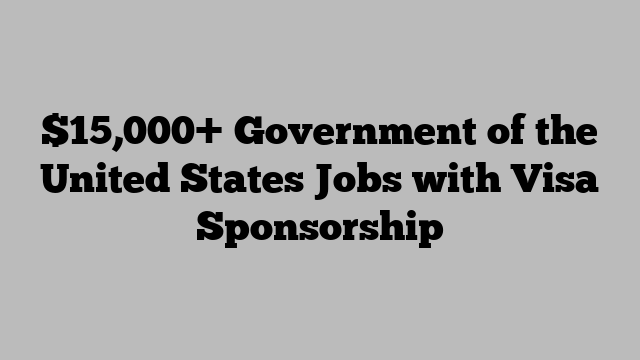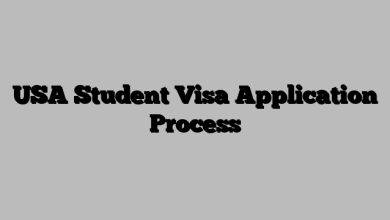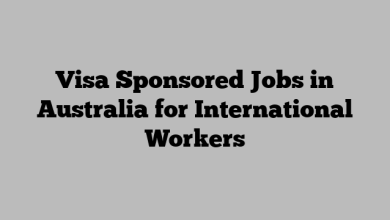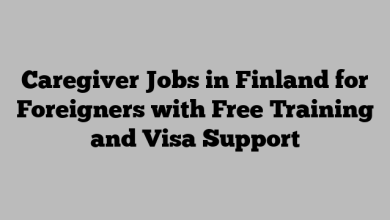$15,000+ Government of the United States Jobs with Visa Sponsorship

The United States government is one of the largest employers in the world, offering thousands of job opportunities across various federal agencies, departments, and public institutions. In 2025, many U.S. government roles are open to foreign nationals through special visa programs, particularly in areas where there’s a domestic skill shortage.
These roles may include research assistants, IT professionals, healthcare workers, teaching staff, contractors, and support personnel—with base salaries starting at $15,000 or more annually. Some jobs offer direct visa sponsorship through official government channels or through partner institutions and government-funded programs.
This article provides a comprehensive guide to U.S. government jobs in 2025 that offer visa sponsorship, salary details, eligibility, and how to apply legally.
Why the U.S. Government Hires Foreign Workers
Although most U.S. federal jobs are reserved for U.S. citizens, there are special categories and federally funded organizations where non-citizens can be legally employed. These include:
- Federal contractors and research institutes
- U.S. Department of State fellowships and foreign service roles
- USAID and U.N.-affiliated programs
- Public universities and laboratories funded by the U.S. government
- STEM jobs under national interest exemptions
- Shortage occupation positions in healthcare and education
Many of these roles qualify for employment-based visas (H-1B, J-1, TN, O-1, etc.), and some include relocation assistance, housing stipends, and Green Card sponsorship after initial employment.
Example Job Categories with $15,000+ Salary and Visa Support
1. Research and Academic Fellowships
- Agencies: NIH, NASA, USDA, NSF, DOE labs
- Visa Type: J-1 Research Scholar or H-1B
- Salary Range: $15,000 – $65,000/year
- Roles: Research assistant, lab tech, data analyst, post-doc fellow
2. Healthcare Support Roles
- Agencies: HHS, CDC, VA Hospitals
- Visa Type: H-1B, TN (for Canada/Mexico), J-1 Clinical Visa
- Salary: $30,000 – $90,000/year
- Roles: Registered Nurse, Physical Therapist, Radiology Technician, Medical Technologist
3. STEM & Tech Jobs
- Agencies: Department of Energy, NASA, DoD contractors
- Visa Type: H-1B, O-1, Optional Practical Training (OPT) for students
- Salary: $60,000 – $120,000/year
- Roles: Software Developer, Cybersecurity Analyst, Engineer, Data Scientist
4. Education and Teaching
- Agencies: Public schools with federal Title I funding, Department of Education programs, BIE (Bureau of Indian Education)
- Visa Type: J-1 Teacher Visa or H-1B
- Salary: $30,000 – $70,000/year
- Roles: STEM teachers, ESL instructors, Special Ed professionals
5. International Affairs & Translation
- Agencies: U.S. Department of State, Peace Corps, USAID
- Visa Type: G-4 (UN roles), H-1B, O-1
- Salary: $35,000 – $85,000/year
- Roles: Cultural liaison, translator, diplomatic assistant, program analyst
6. Skilled Trades & Support Staff (Contract Roles)
- Agencies: U.S. Army Corps of Engineers, DoD, Public Housing Authorities
- Visa Type: H-2B or Green Card via EB-3
- Salary: $20,000 – $50,000/year
- Roles: Electricians, custodial workers, IT support, drivers, security officers
Common Visa Types for Government-Sponsored Employment
| Visa | Purpose | Eligibility |
|---|---|---|
| H-1B | Skilled professionals | Bachelor’s degree & employer sponsorship |
| J-1 | Exchange scholars, teachers, trainees | Sponsored by government-approved program |
| O-1 | Individuals with extraordinary ability | STEM, arts, or research fields |
| TN | Professionals from Mexico/Canada | Requires NAFTA qualifications |
| H-2B | Temporary non-agricultural workers | For labor-intensive, seasonal roles |
| EB-3 | Employment-based Green Card | Unskilled and skilled workers |
Salary and Benefits Overview
Most entry-level U.S. government jobs or affiliated roles start at $15,000 to $25,000 annually (e.g., assistants, clerical support, fellows). More skilled roles can reach $50,000–$120,000, especially in STEM, education, and healthcare.
Additional Perks:
- Relocation allowance
- Free or discounted housing (in fellowships or Peace Corps)
- Health insurance (through employer or partner)
- Education grants or tuition assistance
- Pathway to permanent residency or Green Card
Who Can Apply?
Eligible Applicants:
- Non-U.S. citizens with required educational or professional credentials
- Individuals with clean criminal record and valid passport
- Willingness to relocate or serve in U.S.-funded overseas programs
- English proficiency (proven via tests or academic record)
Applicants from Nigeria, India, Kenya, Ghana, Philippines, Egypt, Pakistan, South Africa, and Latin America are commonly recruited through international partnerships and exchange programs.
How to Find These Jobs
Top Job Portals:
- USAJobs.gov – Official portal for U.S. government jobs (filter by visa-eligible positions)
- NIH OITE – Fellowships and internships
- Peace Corps Careers
- Fulbright & Exchange Programs
- UN Jobs & G-4 Visa Roles
- Teachers of Tomorrow – J-1 teacher sponsors
- HigherEdJobs.com – Public university roles
- ResearchGate Jobs – Academic research positions
Use filters like:
- “Visa sponsorship”
- “H-1B supported”
- “International applicants welcome”
- “Non-citizens eligible”
How to Apply
Step-by-Step:
- Update Resume/CV – Use American format, highlight education, certifications, and any U.S.-recognized degrees
- Search for Matching Roles – Apply only to verified government agencies or official programs
- Prepare Documents:
- Academic transcripts
- Language test (e.g., TOEFL, IELTS) if required
- Recommendation letters
- Passport bio-data
- Attend Interviews – May be online or via embassy
- Visa Processing – Employer or program sponsor initiates the visa paperwork
- Travel to the U.S. – Start date, orientation, and accommodation usually provided
Tips for Getting Hired
- Focus on roles in research, education, tech, and public service
- Have your certificates evaluated (WES or NACES evaluation)
- Apply through recognized exchange programs or direct to government institutions
- Take free online U.S. government courses (e.g., FEMA or USAID) to boost resume
- Network via LinkedIn and email program coordinators or embassy contacts
Caution: Avoid Scams
- Never pay for a U.S. government job or visa sponsorship
- U.S. embassies and agencies do not use agents
- Confirm job offers on official sites (e.g., USAJobs.gov, State.gov)
- Check that the employer is registered with USCIS or Department of Labor




